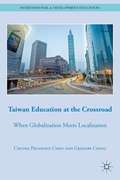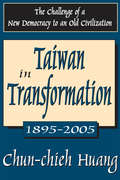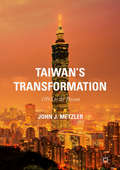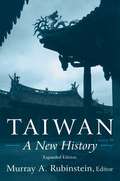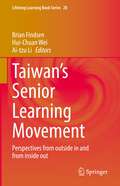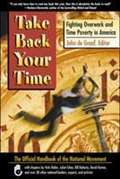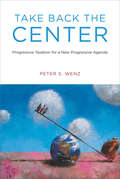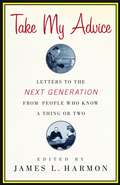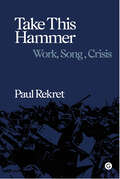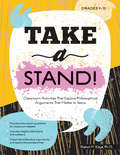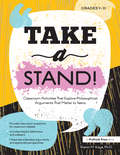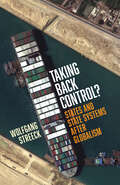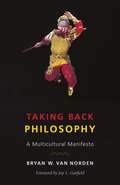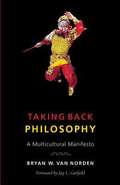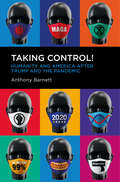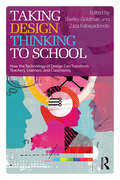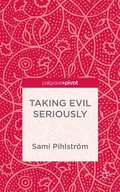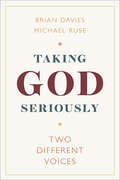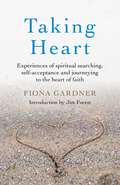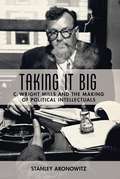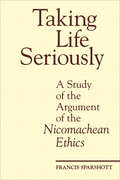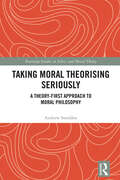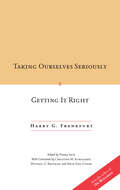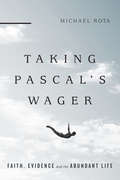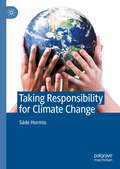- Table View
- List View
Taiwan Education at the Crossroad
by Chuing Prudence Chou Gregory ChingChou and Ching examine the processes of schooling in Taiwan amidst social, cultural, economic, and political conflict resulting from local and global dilemmas. Collectively, these issues offer a panoramic and in-depth glimpse from the past to the future of educational trends in Taiwan.
Taiwan in Transformation 1895-2005: The Challenge of a New Democracy to an Old Civilization
by Chun-chieh HuangThe last decade of the twentieth century witnessed rapid changes not only in global politics but also in Taiwan's quests for new identities. The notorious martial law was lifted in July 1987, and long-repressed calls for democratization began to be heard that caught worldwide attention. In tandem with economic transformation, the entire world of thought in Taiwan underwent significant changes. Both economic and ideological restructuring have been basic elements of transformation in postwar Taiwan. However, rapid democratization has opened a Pandora's box, and stirred a whirlwind of discord.This volume elaborates on the "where from" and the "where to" of the Taiwan transformation and attempts to answer such questions as: Is the old Taiwanese work ethic just a relic of the past? Is Taiwan going to become an Armageddon of ideological wars?Chapters deal with the vicissitudes of Taiwanese nostalgia for cultural China; postwar Taiwan in historical perspective, in particular the rise and fall of the agrarian culture; the transformation of farmers' social consciousness in the period 1950-1970; Confucianism in postwar Taiwan: historical, philosophical, and sociological; the case of Hsu Fu-kuan, which provides an epic case of the intertwining of cultural crisis with personal crisis; the development and metamorphoses of Taiwanese consciousness in the unfolding political context, the awakening of the "self"; and finally "mutual historical understanding" as the basis for Taiwan-Mainland relations in the twenty-first century.Taiwan in Transformation seeks to show that historical insights extrapolated from an understanding of history are essential for grasping and solving the basic problems facing Taiwan at present, including the Taiwan-Mainland relationship in the twenty-first century. It will be of interest to Chinese area specialists, sociologists, and historians.
Taiwan's Transformation: 1895 to the Present
by John J. MetzlerThis book presents a cogent but comprehensive review of Taiwan’s socio-economic transformation from a Japanese colony to a thriving East Asian mini-state. Since the 1980’s, Taiwan has primarily been viewed as a thriving economic model. Though certainly true, this assessment belies the amazing social and political success story for 23 million people on a small New Hampshire-sized island just off the China coast. Metzler highlights the engaging political narrative of democratization as well as Taiwan’s noteworthy accomplishments despite the proximity and opposition of communist China. Further, the result of the 2016 elections and its implication are analyzed. Scholars studying East Asia and policy makers will gain a greater appreciation for the island’s dynamic, prosperous resilience, despite pressure from China.
Taiwan: A New History (Taiwan In The Modern World Ser.)
by Murray A. RubinsteinThis is a comprehensive portrait of Taiwan. It covers the major periods in the development of this small but powerful island province/nation. The work is designed in the style of the multi-volume "Cambridge History of China".
Taiwan’s Senior Learning Movement: Perspectives from outside in and from inside out (Lifelong Learning Book Series #28)
by Brian Findsen Hui-Chuan Wei Ai-Tzu LiThis volume provides an in-depth analysis of historical and recent developments of senior learning in Taiwan, where publications in English have been scant. It takes a broader view on lifelong learning and active ageing from a theoretical/conceptual base written by prominent international authors- this represents the ‘outside in’ perspective. The ‘inside out’ on the other hand signifies an in-depth investigation of initiatives written by authors from Taiwan who are closely involved with developments in policy and practice. The volume is situated theoretically in the intersection of complementary concepts such as lifelong learning, active ageing, later life learning, learning communities and social movements. It is located geographically and culturally in East Asia where senior learning/education is expanding in response to large populations of older adults and concerns about their physical and social well-being. It is argued that Taiwan is leading the way in terms of innovation and community engagement in regard to older adult learning/education and can thus serve as a model for neighboring countries. By analyzing historical precedents, cultural dynamics, policy trends, research sub-fields and community engagement this book is of interest to both East Asian and Western scholars, practitioners, policy-makers and students amongst the fields of lifelong learning, social gerontology and educational psychology.
Take Back Your Time: Fighting Overwork And Time Poverty In America
by John De GraafThe book is timed to publicize Take Back Your Time Day on October 24, 2003, this date intended to highlight that Americans typically work nine weeks longer than Western Europeans. The collection comprises 30 essays by people like Cecile Andrews, author of "Circle of Simplicity"; Kirk Warren Brown, psychology, U. of Rochester; David Korten, author of "When Corporations Rule the World"; Christine Owens of the AFL-CIO; and Camilla Fox of the Animal Protection Institute in Sacramento (Ms. Fox argues that overwork means neglect of pets). Other contributions include short essays (with even shorter editorial introductions) addressing such topics as making the right pitch to supervisors for reduced time, "overemployment" (being forced to work longer than one wants), and overwork's impact on community and the environment.
Take Back the Center: Progressive Taxation for a New Progressive Agenda (The\mit Press Ser.)
by Peter S. WenzReality-based arguments against right-wing fantasies: the case for reducing income inequality, rebuilding our infrastructure, investing in education, and putting people back to work.Midcentury America was governed from the center, a bipartisan consensus of politicians and public opinion that supported government spending on education, the construction of a vast network of interstate highways, healthcare for senior citizens, and environmental protection. These projects were paid for by a steeply progressive tax code, with a top tax rate at one point during the Republican Eisenhower administration of 91 percent. Today, a similar agenda of government action (and progressive taxation) would be portrayed as dangerously left wing. At the same time, radically anti-government and anti-tax opinions (with no evidence to support them) are considered part of the mainstream. In Take Back the Center, Peter Wenz makes the case for a sane, reality-based politics that reclaims the center for progressive policies. The key, he argues, is taxing the wealthy at higher rates. The tax rate for the wealthiest Americans has declined from the mid-twentieth-century high of 91 percent to a twenty-first-century low of 36 percent—even as social programs are gutted and the gap betweeen rich and poor widens dramatically.Ever since Ronald Reagan famously declared that government was the problem and not the solution, conservatives have had an all-purpose answer to any question: smaller government and lower taxes. Wenz offers an impassioned counterargument. He explains the justice of raising the top tax rates significantly, making a case for less income inequality (and countering society's worship of the wealthy), and he offers suggestions for how to spend the increased tax revenues: K-12 education, tuition relief, transportation and energy infrastructure, and universal health care. Armed with Wenz's evidence-driven arguments, progressives can position themselves where they belong: in the mainstream of American politics and at the center of American political conversations, helping their country address a precipitous decline in equality and quality of life.
Take My Advice
by James L. HarmonTake Their Advice: Camille Paglia Wayne Koestenbaum Jonathan Ames Jennifer Belle Howard Zinn Joe Dallesandro Bruce LaBruce Dr. Laura Schlessinger Tom Robbins Judith Butler Martha Nussbaum Horst William S. Burroughs Larry Niven Veruschka Lydia Lunch Spalding Gray Eileen Myles Roger Scruton Ken Kesey Mary Gaitskill Richard Powers Mark Dery Florence King Mark Simpson Bob Shacochis Joanna Scott Quentin Crisp Carolyn Chute Michael Thomas Ford Alexander Theroux George Saunders Charles Baxter Ian Shoales Fay Weldon Bruce Benderson Scott Russell Sanders John Shirley Dr. John Money Cindy Sherman Richard Meltzer Gene Wolfe Abbie Hoffman Diane Wakowski Richard Taylor Bette Davis Arthur Nersesian Jim Harrison Martha Gellhorn Lucius Shepard Dan Jenkins Steve Stern Murray Bookchin John Zerzan Maurice Vellekoop Joel-Peter Witkin Stewart Home Maxx Ardman Katharine Hepburn Bret Lott Lynda Barry Alain de Botton Mary McCarthy Hakim Bey Anita O'Day Chris Kraus R. U. Sirius C. D. Payne W. V. Quine Rita Dove Robert Creeley Valerie Martin Paul Krassner Alphonso Lingis Mark Helprin John Rechy Ram Dass William T. Vollmann and Bettie Page
Take This Hammer: Work, Song, Crisis (Goldsmiths Press / Sonics Series)
by Paul RekretA study of contemporary music in light of transformations to work and social life.The emergence of the popular music industry in the early twentieth century not only drove a wedge between music production and consumption, it also underscored a wider separation of labor from leisure and of the workplace from the domestic sphere. These were changes characteristic of an industrial society where pleasure was to be sought outside of work, but these categories have grown increasingly porous today. As the working day extends into the home or becomes indistinguishable from leisure time, so the role and meaning of music in everyday life changes too. In arguing that the experience of popular music is partly conditioned by its segregation from work and its restriction to the time and space of leisure—the evening, the weekend, the dancehall—Take This Hammer shows how changes to work as it grows increasingly precarious, part-time, and temporary in recent decades, are related to transformations in popular music. Connecting contemporary changes in work and the economy to tendencies in popular music, Take This Hammer shows how song-form has both reflected developments in contemporary capitalism while also intimating a horizon beyond it. From online streaming and the extension of the working day to gentrification, unemployment and the emergence of trap rap, from ecological crisis and field recording to automation and trends in dance music, by exploring the intersections of work and song in the current era, not only do we gain a new understanding of contemporary musical culture, we also see how music might gesture towards a horizon beyond the alienating experience of work in capitalism itself.
Take a Stand!: Classroom Activities That Explore Philosophical Arguments That Matter to Teens
by Sharon KayeTake a Stand! (grades 9–12) helps teens develop critical thinking skills by examining debates on issues directly relevant to their lives (that you won't find in most classroom materials). Each chapter:Covers an important topic relating to electronics, sex, mental health, and relationships.Presents a question for debate, such as "Should kids choose their own religion?" and "Is it possible to love more than one person?"Shows how each issue might arise in an ordinary teen conversation.Presents and explores two or more opposed answers to philosophical debates.Encourages high school students to develop their own positions while learning to appreciate other perspectives.Throughout the book, the chapter contributors—all current or recent teens themselves—highlight key definitions, quote compelling sources, and diagram the central arguments. Each chapter includes discussion questions to guide arguments, as well as helpful sidebars and illustrations to increase comprehension. Perfect for inspiring classroom discussion of topics that matter to today's teens.
Take a Stand!: Classroom Activities That Explore Philosophical Arguments That Matter to Teens
by Sharon M. KayeTake a Stand! (grades 9-12) helps teens develop critical thinking skills by examining debates on issues directly relevant to their lives (that you won't find in most classroom materials). Each chapter:Covers an important topic relating to electronics, sex, mental health, and relationships.Presents a question for debate, such as "Should kids choose their own religion?" and "Is it possible to love more than one person?"Shows how each issue might arise in an ordinary teen conversation.Presents and explores two or more opposed answers to philosophical debates.Encourages high school students to develop their own positions while learning to appreciate other perspectives.Throughout the book, the chapter contributors—all current or recent teens themselves—highlight key definitions, quote compelling sources, and diagram the central arguments. Each chapter includes discussion questions to guide arguments, as well as helpful sidebars and illustrations to increase comprehension. Perfect for inspiring classroom discussion of topics that matter to today's teens.Grades 9-12
Taking Back Control?: States and State Systems After Globalism
by Wolfgang StreeckTaking back control? States and state systems after globalizationThe era of hyperglobalization once hailed as the 'end of history' was characterised by boundless capitalist expansion. The neoliberal revolution gave rise to a politics of scale aimed at the centralization and unification of states and state systems: the replacement of national with global governance or, in Europe, of the nation-state with a supranational superstate, the European Union.The 'New World Order' proclaimed by the United States in the wake of the Soviet collapse proved to be ungovernable by democratic means. Instead, it was ruled through a combination of technocracy and mercatocracy, failing spectacularly to provide for political stability, social legitimacy and international peace. Marked by a series of economic and institutional crises, hyperglobalization gave rise to various kinds of political countermovements that rebelled against and ultimately stopped the upward transfer of state authority in its tracks.This book analyses the ongoing tug-of-war between the forces of globalism and democracy, of centralization and decentralization, and unification and differentiation of states and state systems, and how they are tied to the advance of global capitalism and the prospects for its social and democratic regulation.Exploring the possibility for states and the societies they govern to take back control over their collective fate, the book is an attempt at a renewed theory of the state in political economy. Inspired by the work of Karl Polanyi and John Maynard Keynes, it discusses the potential outlines of a state system allowing for democratic governance within and peaceful cooperation between sovereign nation-states.
Taking Back Philosophy: A Multicultural Manifesto
by Bryan W. Van NordenAre American colleges and universities failing their students by refusing to teach the philosophical traditions of China, India, Africa, and other non-Western cultures? This biting and provocative critique of American higher education says yes. Even though we live in an increasingly multicultural world, most philosophy departments stubbornly insist that only Western philosophy is real philosophy and denigrate everything outside the European canon. In Taking Back Philosophy, Bryan W. Van Norden lambastes academic philosophy for its Eurocentrism, insularity, and complicity with nationalism and issues a ringing call to make our educational institutions live up to their cosmopolitan ideals. In a cheeky, agenda-setting, and controversial style, Van Norden, an expert in Chinese philosophy, proposes an inclusive, multicultural approach to philosophical inquiry. He showcases several accessible examples of how Western and Asian thinkers can be brought into productive dialogue, demonstrating that philosophy only becomes deeper as it becomes increasingly diverse and pluralistic. Taking Back Philosophy is at once a manifesto for multicultural education, an accessible introduction to Confucian and Buddhist philosophy, a critique of the ethnocentrism and anti-intellectualism characteristic of much contemporary American politics, a defense of the value of philosophy and a liberal arts education, and a call to return to the search for the good life that defined philosophy for Confucius, Socrates, and the Buddha. Building on a popular New York Times opinion piece that suggested any philosophy department that fails to teach non-Western philosophy should be renamed a “Department of European and American Philosophy,” this book will challenge any student or scholar of philosophy to reconsider what constitutes the love of wisdom.
Taking Back Philosophy: A Multicultural Manifesto
by Bryan w. Van NordenAre American colleges and universities failing their students by refusing to teach the philosophical traditions of China, India, Africa, and other non-Western cultures? This biting and provocative critique of American higher education says yes. Even though we live in an increasingly multicultural world, most philosophy departments stubbornly insist that only Western philosophy is real philosophy and denigrate everything outside the European canon. In Taking Back Philosophy, Bryan W. Van Norden lambastes academic philosophy for its Eurocentrism, insularity, and complicity with nationalism and issues a ringing call to make our educational institutions live up to their cosmopolitan ideals.
Taking Control!: Humanity and America after Trump and the Pandemic
by Anthony BarnettLast call for humanity? Americans can now secure or destroy the world.From Anthony Barnett, the creator and former editor-in-chief of openDemocracy, comes this blazing response to the confrontation between Trumpism and Biden in America, that sets out how the future of humankind is at stake.On 6 January 2021, Donald Trump tried to seize the US presidency by force. His aim: to consolidate his nativist rule. He was, and still is, supported by tens of millions of Americans. In response, Joe Biden's administration promises a massive economic shift while a decisive contest unfolds over voter suppression. This contest is of epochal importance. As the future of humankind passes through the prism of the most powerful country in the world, Barnett reflects on the stark, limited spectrum of possible outcomes. He shows that the frustration of Trumpism is thanks to the decades long resistance to market fundamentalism. But it remains divided and incoherent. It is time for the left to embrace an open, ecological politics or the world will be subordinated to the regimes of the Iron Men and their successors.
Taking Design Thinking to School: How the Technology of Design Can Transform Teachers, Learners, and Classrooms
by Shelley Goldman Zaza KabayadondoDesign thinking is a method of problem-solving that relies on a complex set of skills, processes and mindsets that help people generate novel solutions to problems. Taking Design Thinking to School: How the Technology of Design Can Transform Teachers, Learners, and Classrooms uses an action-oriented approach to reframing K-12 teaching and learning, examining interventions that open up dialogue about when and where learning, growth, and empowerment can be triggered. While design thinking projects make engineering, design, and technology fluency more tangible and personal for a broad range of young learners, their embrace of ambiguity and failure as growth opportunities often clash with institutional values and structures. Through a series of in-depth case studies that honor and explore such tensions, the authors demonstrate that design thinking provides students with the agency and compassion that is necessary for doing creative and collaborative work, both in and out of the classroom. A vital resource for education researchers, practitioners, and policymakers, Taking Design Thinking to School brings together some of the most innovative work in design pedagogy.
Taking Evil Seriously
by Sami PihlströmWhile moral philosophy has traditionally been understood as an examination of the good life, this book argues that ethical inquiry should, rather, begin from an examination of evil and other 'negative' moral concepts, such as guilt and suffering.
Taking God Seriously: Two Different Voices
by Michael Ruse Brian DaviesIs debate on issues related to faith and reason still possible when dialogue between believers and non-believers has collapsed? Taking God Seriously not only proves that it is possible, but also demonstrates that such dialogue produces fruitful results. Here, Brian Davies, a Dominican priest and leading scholar of Thomas Aquinas, and Michael Ruse, a philosopher of science and well-known non-believer, offer an extended discussion on the nature and plausibility of belief in God and Christianity. They explore key topics in the study of religion, notably the nature of faith, the place of reason in discussions about religion, proofs for the existence of God, the problem of evil, and the problem of multiple competing religious systems, as well as the core concepts of Christian belief including the Trinity and the justification of morality. Written in a jargon-free manner, avoiding the extremes of evangelical literalism and New Atheism prejudice, Taking God Seriously does not compromise integrity or shy from discussing important or difficult issues.
Taking Heart: Experiences of Spiritual Searching, Self-Acceptance and Journeying to the Heart of Faith
by Fiona GardnerThe meaning and mystery of life is ultimately found in personal relationship, sometimes with another and, for those who search, sometimes with God. In Taking Heart the experiences of four people who are spiritually searching and looking for a direct experience of God are explored, and their different journeys through self-doubt to self-acceptance and to the heart of faith are discussed. These four people are neither especially religious nor spiritual, and nor are they famous. They are ordinary people on an extraordinary search for meaning. As with all journeys there is discovery but also an uncovering and a recovering. All heart journeys are an exodus that takes us out of captivity and are also the passion story which is at the heart of the mystery of faith, a journey through the very worst and towards the very best. And, throughout the spiritual journey, God is shaping and forming our inner life in the unknown depths of our heart.
Taking It Big: C. Wright Mills and the Making of Political Intellectuals
by Stanley AronowitzC. Wright Mills (1916–1962) was a pathbreaking intellectual who transformed the independent American Left in the 1940s and 1950s. Often challenging the established ideologies and approaches of fellow leftist thinkers, Mills was central to creating and developing the idea of the "public intellectual" in postwar America and laid the political foundations for the rise of the New Left in the 1960s. Written by Stanley Aronowitz, a leading sociologist and critic of American culture and politics, Taking It Big reconstructs this icon's formation and the new dimension of American political life that followed his work.Aronowitz revisits Mills's education and its role in shaping his outlook and intellectual restlessness. Mills defined himself as a maverick, and Aronowitz tests this claim (which has been challenged in recent years) against the work and thought of his contemporaries. Aronowitz describes Mills's growing circle of contacts among the New York Intellectuals and his efforts to reenergize the Left by encouraging a fundamentally new theoretical orientation centered on more ambitious critiques of U.S. society. Blurring the rigid boundaries among philosophy, history, and social theory and between traditional orthodoxies and the radical imagination, Mills became one of the most admired and controversial thinkers of his time and was instrumental in inspiring the student and antiwar movements of the 1960s. In this book, Aronowitz not only reclaims this critical thinker's reputation but also emphasizes his ongoing significance to debates on power in American democracy.
Taking Life Seriously: A Study of the Argument of the Nicomachean Ethics
by F. E. SparshottThis is the first book in modern times that makes sense of the Nicomachean Ethics in its entirety as an interesting philosophical argument, rather than as a compilation of relatively independent essays. In Taking Life Seriously Francis Sparshott expounds Aristotle's Nicomachean Ethics as a single continuous argument, a chain of reasoned exposition on the problems of human life. He guides the reader through the whole text passage by passage, showing how every part of it makes sense in the light of what has gone before, as well as indicating problems in Aristotle's argument. No knowledge of Greek is required. When the argument does depend on the precise wording of the Greek text, translations and explanatory notes are provided, and there is a glossary of Greek terms. Sparshott offers insightful and useful criticism, making Taking Life Seriously the best available companion to a first reading of the Ethics.
Taking Moral Theorising Seriously: A Theory-First Approach to Moral Philosophy (Routledge Studies in Ethics and Moral Theory)
by Andrew SneddonThis book develops a plausible and novel account of methodology for moral philosophy. It focuses on the structural features of moral theories, specifically what is taken as input and the process of theorising itself.Philosophers have long neglected the difficulties of identifying and using good input for moral theorising. The first part of the book argues that we should use “contrastively successful” judgements as input. A moral judgement about a case must be shown to be interpersonally superior to alternatives to qualify as input for moral theorising. The next part of the book follows recent work on theoretical virtues in science to develop an account of virtues of moral theories. It argues that moral theorists should seek defeasibly parallel maximisation of the virtues of moral theories. It then applies this overall account of a method for moral philosophy to the topic of agent-relativity and agent-neutrality.Taking Moral Theorising Seriously will appeal to researchers and graduate students interested in moral philosophy and philosophical methodology.
Taking Ourselves Seriously and Getting It Right [DECKLE EDGE]
by Harry G. FrankfurtHarry G. Frankfurt begins his inquiry by asking, "What is it about human beings that makes it possible for us to take ourselves seriously?" Based on The Tanner Lectures in Moral Philosophy, Taking Ourselves Seriously and Getting It Right delves into this provocative and original question. The author maintains that taking ourselves seriously presupposes an inward-directed, reflexive oversight that enables us to focus our attention directly upon ourselves, and "[it] means that we are not prepared to accept ourselves just as we come. We want our thoughts, our feelings, our choices, and our behavior to make sense. We are not satisfied to think that our ideas are formed haphazardly, or that our actions are driven by transient and opaque impulses or by mindless decisions. We need to direct ourselves—or at any rate to believe that we are directing ourselves—in thoughtful conformity to stable and appropriate norms. We want to get things right." The essays delineate two features that have a critical role to play in this: our rationality, and our ability to love. Frankfurt incisively explores the roles of reason and of love in our active lives, and considers the relation between these two motivating forces of our actions. The argument is that the authority of practical reason is less fundamental than the authority of love. Love, as the author defines it, is a volitional matter, that is, it consists in what we are actually committed to caring about. Frankfurt adds that "The object of love can be almost anything—a life, a quality of experience, a person, a group, a moral ideal, a nonmoral ideal, a tradition, whatever." However, these objects and ideals are difficult to comprehend and often in conflict with each other. Moral principles play an important supporting role in this process as they help us develop and elucidate a vision that inspires our love. The first section of the book consists of the two lectures, which are entitled "Taking Ourselves Seriously" and "Getting It Right." The second section consists of comments in response by Christine M. Korsgaard, Michael E. Bratman, and Meir Dan-Cohen. The book includes a preface by Debra Satz.
Taking Pascal's Wager: Faith, Evidence and the Abundant Life
by Michael RotaSince we can't know with absolute certainty that God exists, each of us in a sense makes a bet. If we believe in God and are right, the benefits include eternal life. If we are wrong, the downside is limited. On the other hand, we might not believe in God. If we are right, then we will have lived in line with reality. If we are wrong, however, the consequences could be eternally disastrous. This was the challenge posed by the French philosopher Blaise Pascal over three hundred years ago. But Michael Rota contends that Pascal's argument is still compelling today. Since there is much to gain (for ourselves as well as for others) and relatively little to lose, the wise decision is to seek a relationship with God and live a Christian life. Rota considers Pascal's wager and the roles of uncertainty, evidence and faith in making a commitment to God. By engaging with themes such as decision theory, the fine-tuning of the universe, divine hiddenness, the problem of evil, the historicity of the resurrection and the nature of miracles, he probes the many dynamics at work in embracing the Christian faith. In addition, Rota takes a turn not found in many books of philosophy. He looks at the actual effects of such a commitment in three recent, vivid, gripping examples—Dietrich Bonhoeffer, Jean Vanier and Immaculée Ilibagiza. Like Pascal, Rota leaves us with a question: What wager will we make?
Taking Responsibility for Climate Change
by Säde HormioThis book proposes that it is not only states and international bodies that have a responsibility to take action toward mitigating climate change. Other collective agents, such as corporations, need to also come onboard. Additionally, the book argues that climate change is not solely a problem for collective agents, but also for individuals, as they are members of collectives and groups of several kinds. Therefore, framing climate change responsibility exclusively from either the collective or the individual perspective leaves out something crucial: how we all are influenced by the collectives we belong to and how, in turn, collectives are influenced by individuals. The focus of the book is on areas of climate change responsibility that are often left out of the picture or get too little attention in climate ethics, such as carbon inequality within countries. But why should any theoretical arguments about normative issues matter when we have a real-life climate crisis on our hands? Säde Hormio argues that ethical arguments have an important role in setting climate policy: they can highlight what values are at stake and help ground normative arguments in public deliberations.
